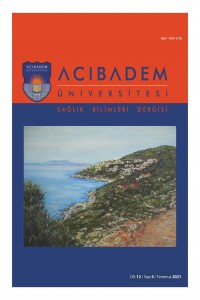Abstract
Supporting Institution
HERHANGİ BİR KURUM TARAFINDAN DESTEKLENMEMİŞTİR.
References
- References: 1. Ergün, S., Sürücüler, H. K., & Işık, R. (2019). Ergenlerde e-Sağlık Okuryazarlığı ve Sağlıklı Yaşam Biçimi Davranışları: Balıkesir Örneği. JAREN, 5(3), 194-203.
- 2. Bertot JC, Jaeger PT, Hansen D. The Impact Of Polices On Government Social Media Usage: Issues, Challenges, And Recommendations. Government Information Quarterly2012; 29(1):30-40.
- 3. Chretien KC, Kind T. Social media and clinical care ethical, professional, and social implications. Circulation 2013; 127(13):1413-1421.
- 4. Babacan M, Haşlak İ, Hira İ. Sosyal Medya ve Arap Baharı. Akademik İncelemeler Dergisi 2011; 6(2):63-92.
- 5. Aslantekin, F, Yumrutaş M. Sağlık Okuryazarlığı Ve Ölçümü. TAF Preventive Medicine Bulletin 2014;13(4):327- 334.
- 6. Çimen, Z., Bayık Temel A. Kronik Hastalığı Olan Yaşlı Bireylerde Sağlık Okuryazarlığı ve Sağlık Algısı İlişkisi. Ege Üniversitesi, Sağlık Bilimleri Enstitüsü, Halk Sağlığı Hemşireliği, Yayınlanmamış Yüksek Lisans Tezi, İzmir 2015.
- 7. Pourrazavi, S., Kouzekanani, K., Bazargan-Hejazi, S., Shaghaghi, A., Hashemiparast, M., Fathifar, Z., & Allahverdipour, H. (2020). Theory-based E-health literacy interventions in older adults: a systematic review. Archives of public health = Archives belges de sante publique, 78, 72. https://doi.org/10.1186/s13690-020-00455-6
- 8. Norman CD, Skinner HA. eHealth literacy: essential skills for consumer health in a networked world. Journal of Medical Internet Research 2006; 8(4): e27.
- 9. Tamer Gencer Z. Norman ve Skınner’ın E-Sağlık Okuryazarlığı Ölçeğinin Kültürel Uyarlaması İçin Geçerlilik ve Güvenilirlik Çalışması. İstanbul Üniversitesi İletişim Fakültesi Dergisi; 2017(52):131-145.
- 10. Şengül H, Çınar F, Çapar H, Bulut A, Çakmak C. Sağlık Bilimleri Fakültesi Öğrencilerin E-Sağlık Okuryazarlığı Düzeyleri Ve İnternet Kullanımına Yönelik Tutumları: Bir Vakıf Üniversitesi Örneği. Journal of Social And Humanities Sciences Research 2017; 4(12): 1277-1287.
- 11. Rideout, Victoria (2001). Generation Rx.Com: How Young People Use the Internet for Health Information. A Kaiser Family Foundation Survey. California,USA.
Abstract
Aim
It is stated that social media sites, which has been started to be used widely also in the field of health, are used as a potential resource for health information. In this study, it is aimed to determine the e-health literacy level in university students.
Methods
The descriptive type of research was conducted in Yozgat Bozok University Faculty of Education between May and June 2019. For the research, ethics approval was obtained from Erciyes University Clinical Research Ethics Committee, and permission was obtained from Yozgat Bozok University. 310 people who did not have communication barriers and accepted to participate in the study were interwieved face to face. Socio-demographic questionnaire form and ehealth literacy scale were used as data collection tools.
Results
The average age of the research group was 21.0±0, and 69.1% of it was female. 56.2% of the students stated that they obtained health-related information from doctors, 69.7% consulted doctors when they had problems about following the given medical advice or recommendations, and 57.7% stated that that they understood informed consent forms. 57.4% of the students indicated that the internet was useful for health-related decisions and it was important to access health resources on the internet. The total score average of the ehealth literacy scale of the students was 28.4±0.3
Conclusion
In our study, it was determined that students have a moderate perception of e-health literacy and use the internet for health-related issues.
Keywords
References
- References: 1. Ergün, S., Sürücüler, H. K., & Işık, R. (2019). Ergenlerde e-Sağlık Okuryazarlığı ve Sağlıklı Yaşam Biçimi Davranışları: Balıkesir Örneği. JAREN, 5(3), 194-203.
- 2. Bertot JC, Jaeger PT, Hansen D. The Impact Of Polices On Government Social Media Usage: Issues, Challenges, And Recommendations. Government Information Quarterly2012; 29(1):30-40.
- 3. Chretien KC, Kind T. Social media and clinical care ethical, professional, and social implications. Circulation 2013; 127(13):1413-1421.
- 4. Babacan M, Haşlak İ, Hira İ. Sosyal Medya ve Arap Baharı. Akademik İncelemeler Dergisi 2011; 6(2):63-92.
- 5. Aslantekin, F, Yumrutaş M. Sağlık Okuryazarlığı Ve Ölçümü. TAF Preventive Medicine Bulletin 2014;13(4):327- 334.
- 6. Çimen, Z., Bayık Temel A. Kronik Hastalığı Olan Yaşlı Bireylerde Sağlık Okuryazarlığı ve Sağlık Algısı İlişkisi. Ege Üniversitesi, Sağlık Bilimleri Enstitüsü, Halk Sağlığı Hemşireliği, Yayınlanmamış Yüksek Lisans Tezi, İzmir 2015.
- 7. Pourrazavi, S., Kouzekanani, K., Bazargan-Hejazi, S., Shaghaghi, A., Hashemiparast, M., Fathifar, Z., & Allahverdipour, H. (2020). Theory-based E-health literacy interventions in older adults: a systematic review. Archives of public health = Archives belges de sante publique, 78, 72. https://doi.org/10.1186/s13690-020-00455-6
- 8. Norman CD, Skinner HA. eHealth literacy: essential skills for consumer health in a networked world. Journal of Medical Internet Research 2006; 8(4): e27.
- 9. Tamer Gencer Z. Norman ve Skınner’ın E-Sağlık Okuryazarlığı Ölçeğinin Kültürel Uyarlaması İçin Geçerlilik ve Güvenilirlik Çalışması. İstanbul Üniversitesi İletişim Fakültesi Dergisi; 2017(52):131-145.
- 10. Şengül H, Çınar F, Çapar H, Bulut A, Çakmak C. Sağlık Bilimleri Fakültesi Öğrencilerin E-Sağlık Okuryazarlığı Düzeyleri Ve İnternet Kullanımına Yönelik Tutumları: Bir Vakıf Üniversitesi Örneği. Journal of Social And Humanities Sciences Research 2017; 4(12): 1277-1287.
- 11. Rideout, Victoria (2001). Generation Rx.Com: How Young People Use the Internet for Health Information. A Kaiser Family Foundation Survey. California,USA.
Details
| Primary Language | English |
|---|---|
| Subjects | Public Health, Environmental Health |
| Journal Section | Research Articles |
| Authors | |
| Publication Date | July 1, 2021 |
| Submission Date | January 31, 2021 |
| Published in Issue | Year 2021Volume: 12 Issue: 3 |


